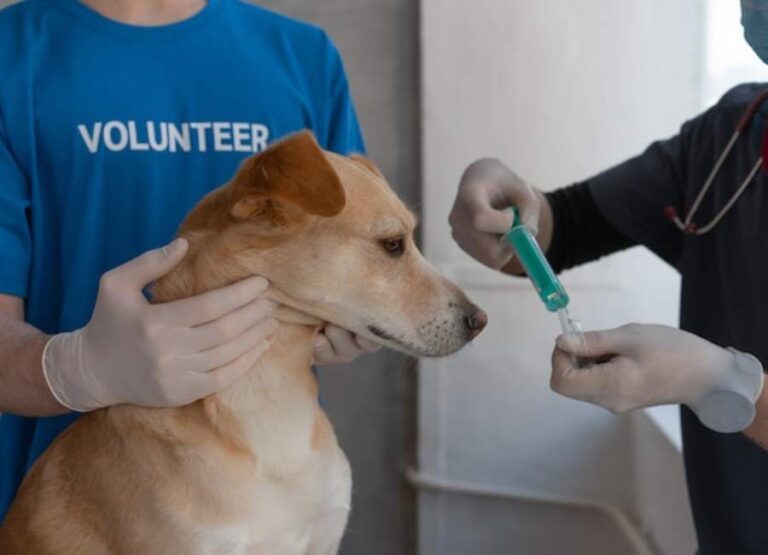10 Potential Reasons For Boston Terrier Shaking

Boston terrier shaking can quickly become a problem for owners who don’t have a clue about what is happening.
The Boston terrier is a very energetic and playful dog, so what happens if your Boston terrier shakes?
They like to be active and have plenty of energy, which can make it difficult for them to stay calm when something triggers their excitement or gets them scared.
Boston terrier shaking
Boston Terriers are known for their shivering, or “cold-shivering,” behavior. This is a reflexive response to danger or fear and is usually seen as a sign of being scared or nervous.
Boston Terriers are not the only breed that might experience cold shivering, other breeds that commonly experience this behavior include the Cocker Spaniel, Dachshund, Welsh Corgi, and Pug.
While the cause of cold shivering in these breeds is not fully understood, it is thought that it might be related to their heritage as working dogs, which may make them more sensitive to cold temperatures.
Reasons for Boston terrier shaking
If you are concerned about your pet shaking, here are some reasons why your Boston terrier may be shaking:
Being hypothermia or hyperthermia
Hypothermia is when your dog’s body temperature is too low. This can happen if they are left outside in cool temperatures or if they are taken out at night and not protected from the cold air.
The Boston terrier, as a breed, is more susceptible to hypothermia than other breeds because of their size and fur coat.
Hyperthermia is when your dog’s body temperature exceeds normal levels and becomes dangerous for them to stay at that level for long periods of time (such as being left in direct sunlight).
Hyperthermia can also occur due to exercise or heat stroke caused by working too hard outdoors during the summer months.
Being scared or startled
Boston terriers are very sensitive and can be scared by loud noises or sudden movements.
Boston terriers may also be frightened by unfamiliar people, places, or things.
If your Boston terrier is exposed to something that scares him/her (like a strange dog).
He/she might start shaking in order to get away from the situation as quickly as possible.
Being excited
If your Boston terrier is excited, it’s probably because of something new or because you are coming back from work.
This can be anything from a new person in the house or their favorite toy being played with.
Boston terriers are very social dogs and love to play with other people and dogs (and sometimes even squirrels).
They also tend to be very energetic, so they may get excited when bounding around your home or yard.
If this sounds like something that happens with your Boston Terrier, then congratulations! You have yourself one happy girl!
Like any breed of dog, Boston Terriers are also very sensitive creatures who respond well when taken care of properly—especially by humans who love them dearly!
Having separation anxiety
If your Boston Terrier is shaking when you leave the room and getting upset when you return, this is a sign that he has separation anxiety.
This can be overcome with some simple steps:
- Identify the triggers that cause the dog to become anxious when separated from the owner.
- Establish a routine for daily dog separation, including when the dog is taken for walks, played with, and fed.
- Train the dog to associate positive experiences (such as being taken for a walk) with being separated from the owner.
- Implement a contingency plan in case of an emergency, such as leaving a toy or food toy with the dog in case it becomes anxious during separation.
- Regularly assess the dog’s progress and make any necessary adjustments to the routine or contingency plan.
- Don’t leave him alone while you’re at work or in public. If possible, try to keep another family member around who doesn’t have any pets so they can take care of them if needed.
Feeling pain
Pain is a common cause of trembling and shaking. In fact, it’s the most common reason for Boston terriers to shake.
- Arthritis: Arthritis is a condition that causes joint pain and stiffness in your dog’s joints, which can be helped by taking him to the vet regularly for treatment.
- Cancer: Cancer can cause your dog to lose his appetite and become weak, which may result in him shaking or trembling more often than usual (especially if he has cancer).
- If you notice any signs of illness or disease on your Boston terrier’s body—such as an increased amount of hair loss from any part of its body—it’s important to take them straight away, so they can get treatment as soon as possible!
Having a seizure
A seizure is a sudden and temporary loss of consciousness in your Boston terrier.
The cause may be due to an abnormal electrical discharge in the brain (a seizure), or it may be non-seizure related, such as fainting.
Symptoms include stiffening, shaking, and trembling of one or both hind legs; drooling; lowering head into the chest.
Jerking movements that spread over the body (simple partial seizures); twitching eyelids; staring fixedly with dilated pupils (tonic-clonic seizures).
If you suspect your pet has experienced a seizure:
- Immediately call your veterinarian!
- Keep cool. Don’t panic!
- Do not try to restrain your dog in any way unless absolutely necessary.
Having epilepsy
If your Boston Terrier is shaking, it may be a sign of epilepsy.
Boston terriers are known for their friendly personalities and playful nature.
However, Boston terriers can also suffer from epilepsy, which is a neurological disorder.
Epilepsy is characterized by seizures, which can be mild or severe.
Seizures can affect a Boston terrier’s normal behavior and can be a cause of shaking due to epilepsy.
Most seizures in Boston terriers are caused by a type of epilepsy called focal epilepsy.
In focal epilepsy, seizures usually occur in one area of the brain, such as the temporal lobe.
Boston terriers are particularly prone to focal epilepsy because of their small size and their propensity for developing brain tumors.
Liver Diseases
If your Boston Terrier is shaking, it may be a sign of liver disease.
When a Boston terrier is shaking due to liver diseases, it is usually due to either hepatitis or cirrhosis.
There are a few other causes of shaking, but these are the most common.
Hepatitis is a viral infection that can affect any dog but is most commonly seen in dogs of the Boston terrier breed.
The virus attacks the liver and can cause a wide range of symptoms, the most common of which is shaking.
Cirrhosis is a condition in which the liver can no longer function properly. This can cause a wide range of symptoms, but the most common is shaking.
Boston terriers are particularly susceptible to heart disease as well.
Both fatty liver disease and hepatitis can cause shaking when to present together, but separate diseases may produce different symptoms from each other.
So it’s important not only that you check if there are any signs associated with either condition but also look at whether they’ve been diagnosed separately before making any conclusions about why your companion might be ill or not feeling well right now.
Having a neurological problem
There are a few things that could be causing your Boston terrier to shake and tremble.
The most common culprit is a neurological problem, such as a tumor, stroke, or brain injury.
If your Boston terrier is shaking and trembling for no apparent reason, it’s best to take him to a veterinarian for an examination.
If the vet determines that there is a neurological problem, he or she will likely refer your Boston terrier to a neurologist for treatment.
- Boston terriers are prone to neurological problems, which can cause shaking and other signs of discomfort.
- Signs of a neurological problem include head tilt, wobbling, and stumbling.
- A vet can help diagnose and treat the problem if it’s not too severe. If left untreated, it can become fatal in some cases!
Signs of cold
Boston terriers are famous for their tendency to shake, which can be caused by a number of factors.
It’s important to remember that this is a behavior and not an illness, so if your dog is shaking or showing signs of cold-like symptoms—lethargy, pale gums (white).
Rapid breathing (irregular or fast), drooling—it’s best to consult your veterinarian immediately.
Pale gums (white). If you see any changes in the color of your pet’s gums during illness or after exposure to cold temperatures outside (for example snowboarding).
Then it’s likely that he has suffered from hypothermia (low body temperature).
This condition can cause brain damage if left untreated; however, treatment may help prevent further damage by raising his core body temperature back up again quickly before he becomes unconscious from lack of oxygen flow through his system due.
Sign of old age
As Boston terriers age, their muscles may become stiffer and less responsive.
This can lead to reduced mobility and difficulty walking, jumping, and other normal dog behaviors.
In addition, some elderly Boston terriers may experience a condition called tremors, which is a series of short, involuntary movements of the limbs and body.
Tremors may be mild or severe and may last for a few seconds or minutes.
If your Boston terrier is experiencing tremors, there are several things you can do to help him feel better.
First, make sure he has a comfortable place to rest, such as a comfortable bed or sofa.
If you notice any signs of nervousness or shaky movements when interacting with your pet Boston Terrier, then there may be something wrong with him/her!
What to do if your Boston terrier is shaking
If your Boston terrier is shaking, there are a few things you can do to help him feel more comfortable.
First, make sure that your Boston terrier is warm and dry. Give him a warm coat or a towel to lay on.
Second, try to keep your Boston terrier as calm as possible. Speak to him in a soft, calming voice and try not to move him around too much.
Finally, try to provide your Boston terrier with some simple distractions. If he’s shaking because he’s scared, give him some toys to play with or a Kong toy to chew on.
- Immediately take your Boston terrier to the veterinarian to rule out any health issues.
- Try to calm your Boston terrier down by praising her and giving her some love.
- If your Boston terrier is shaking from fear, try to make her feel secure by placing her in a safe place and talking to her calmly.
- If your Boston terrier is shaking from excitement, try to distract her by playing with her or giving her a treat.
- If your Boston terrier is shaking from boredom, try to provide her with a toy or activity to keep her busy.
Conclusion
It’s important to know the signs of cold and take it seriously. If you notice your dog shaking, don’t just assume that it is because he’s hot or cold.
It could be something more serious like a neurological problem or seizure disorder.
Always talk to a qualified veterinarian.






